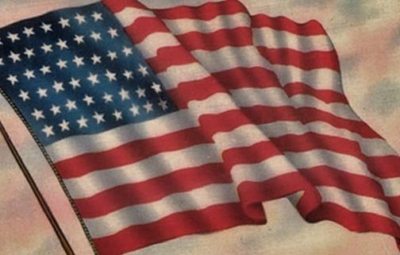| by Maj. Joseph Labarbera (U.S. Army)
Lima Charlie News
On Monday, May 30, 2016, Memorial Day, the non-profit organization The Greatest Generations Foundation took ten WWII veterans back to Normandy, France, to return to the battlefields they fought on, enabling closure of their war experiences. Among those heroes is veteran Emery Horn (Co. B 242 Inf. 42 Div. POW). This is his story.
Emery Horn was a child of the Great Depression, a farm boy whose reality was hard work from sun up to sun down combined with a normalcy of thriftiness, and an intrinsic sense of teamwork that can only be found on a farm, where everyone must pull their weight. Not a lot of room for drama queens or freeloaders on a Depression Era farm.
Emery Horn is the third of eight brothers and seven sisters. Six of his brothers served their country honorably, and survived World War II. He was born and raised in Freestone, Pennsylvania. His eldest brother was at Pearl Harbor when the US Naval Base was bombed by the Japanese sneak attack on December 7, 1941. Although Emery could have avoided serving during the Second World War by utilizing a farm deferment, he chose to enlist on December 7, 1943. It just wasn’t the way of men like him to sit out a job that needed to be done. There is a belief in Christianity that the Lord only burdens us with what we can bare. In Emery Horn’s case, the good Lord had a high estimation of him indeed. Seven decades later he recollects:
“I will never forget my buddies who I left behind and who, unlike me, did not return to the tune of Johnny Comes Marching Home Again.”
 As I listened to the firm, resolute parlance of Emery Horn on the other end of the line—on the Friday before the Memorial Day weekend—I found a kindred spirit of sorts in a fellow Rifleman. The voice of a now-90-year-old grunt, a survivor of three bloody campaigns in the European theater of operations, one of the battle tested men of the storied Rainbow Division. They call Infantrymen grunts for a reason. Infantrymen possess an ability that few men have. The ability to not only endure pain, discomfort, and alarming degrees of stress, but to thrive in it, to achieve results when the average human simply focuses inward. Many an accomplished athlete and talented academician has withered under the burden of Infantry training, let alone combat. Emory Horn is the embodiment of the Infantryman in that he endures to maintain the fight. After the war, his burden will no longer be survival, but to carry the lonely memories of men and events that are largely forgotten by today’s America. His tale reminds us that this part of the year is larger than the unofficial first day of summer, bigger than just a day to avail of the best sales of the year at the department stores. It is the most expensive day of the year, paid for with the lives of those who would do anything for this country—their country. For their intrepid brothers with whom they grew closer than any blood relative could ever imagine.
As I listened to the firm, resolute parlance of Emery Horn on the other end of the line—on the Friday before the Memorial Day weekend—I found a kindred spirit of sorts in a fellow Rifleman. The voice of a now-90-year-old grunt, a survivor of three bloody campaigns in the European theater of operations, one of the battle tested men of the storied Rainbow Division. They call Infantrymen grunts for a reason. Infantrymen possess an ability that few men have. The ability to not only endure pain, discomfort, and alarming degrees of stress, but to thrive in it, to achieve results when the average human simply focuses inward. Many an accomplished athlete and talented academician has withered under the burden of Infantry training, let alone combat. Emory Horn is the embodiment of the Infantryman in that he endures to maintain the fight. After the war, his burden will no longer be survival, but to carry the lonely memories of men and events that are largely forgotten by today’s America. His tale reminds us that this part of the year is larger than the unofficial first day of summer, bigger than just a day to avail of the best sales of the year at the department stores. It is the most expensive day of the year, paid for with the lives of those who would do anything for this country—their country. For their intrepid brothers with whom they grew closer than any blood relative could ever imagine.
After moving along the Rhine River to Hatten, France, he was part of repelling the audacious attack by the elite Waffen SS, known as the Battle of the Bulge. When needed, he operated the Browning Automatic Rifle, known as the “BAR.” A heavy automatic weapon that spewed powerful .30 caliber rounds and was the support system for his squad of 9-12 fellow grunts. It wasn’t long after the Battle of the Bulge, where cold, exhausted but still on the offensive, he was captured by the Germans. It was January 9th, 1945. “The Germans were shooting away with a tank. They were shooting at me with machine guns in the field and not a single round hit me. It wasn’t until I finally ran into an open area in the field where they were keeping the prisoners that I was ultimately captured. I thank God they never struck me with a bullet.” This event does not surprise many combat veterans. What combat vets know is that the craziest, most illogical things happen. This is why they hesitate to tell stories. Because in retrospect, many combat vets can’t believe they actually happened, even though having lived through it. It’s ludicrous to a combat vet that someone would plan according to a scheme of assumptions based on an academic logic. Just like it seems ludicrous that a 19 year old private would survive being fired on by a tank’s machine gun as he stood out in the open. This is the nature of war. Chaos supplants logic.
Having served as a Infantryman for most of my entire adult life, within that time spending 54 months in Iraq and Afghanistan, I personally have never been put to the test in the way the young 19-year-old Emery was. Not only did he fight through Normandy and the Battle of the Bulge, two battles that were epic in scale and wrought with chaos and uncertainty, but he also spent seven months as a prisoner of war, in a camp called STALAG 4B. It’s obvious that Mr. Horn understands the true meaning of Memorial Day, because for him, like me as well, Memorial Day is every day for the rest of his life.
Having been through some training designed to break down the spirit, I could only guess at the humiliation and despair that must have been commonplace in Emery’s experience. The closest I can fathom to that, is having been a “recycle” while a student at U.S. Army Ranger School, where we were basically used as servants in between training cycles to a cadre of sadistic non-combat veteran NCOs, all of whom had been relieved by the Chief of Infantry himself for abusing Ranger Students. My memories of being ordered to re-clean urinals after an Instructor had urinated all over them, the days spent mowing lawns, and being on all fours in the rain scraping weeds out of cracks in the asphalt with a dull entrenching tool anger me to this day. Instead of building character, it left me hateful. However, I knew that it would pass, I knew that they couldn’t kill me, and I knew that at least I was getting paid every two weeks. Emery didn’t have those three blessings that made all the difference. Any day he knew it could mean his death. He was near starvation the entire time, and his sustenance depended on his worn down wits and exhausted sense of awareness. Yet he tells of this time with a faint chuckle in his voice, almost to say: “Hah! Check out my story about this crazy time” as he may have recounted over beers at a local pub, telling his story and bits and pieces, for the value of having simply a good conversation. To my view of the world, Emery is the kind of Man I would depend on through thick and thin.
The memories of his time in STALAG 4B are painful, and the details he did share are indelibly etched upon my mind. “At one point, they needed a group of guys to build a ditch from one factory to the next. This was after spending almost three days in the POW camp. This is what got me out of the boxcars which they were holding us in and I was so relieved. Even more so, the ditch was the safest place to hide in when the Americans started dropping bombs. The Americans started bombing anything and everything in sight—anything that moved—by the war’s end. They were so close that you could practically see the bomb bay doors opening.”
Like all true warriors, Emery is humble. A refreshing change to the often glorified picture of the military popinjay we sometimes bear witness to. “I wouldn’t say I was tortured. You learn to tolerate a lot. But we definitely had limited food supply. Heck—the Germans barely had any food for themselves!” He entered the STALAG at 165 pounds and came out weighing 90 pounds. He often found creative ways to find resources to sustain himself and his members of his STALAG. He recounted a memorable story to me: “We even traded with the French bakers because, at night, we would put our shoes in with bundles of towels. The bakers would take the shoes and, in exchange, they would give us three loaves of bread. Heck, the Germans could never quite understand how the French civilians were getting their hands on so many new articles of U.S. Army clothing! Every day during inspection, the Germans lined us up and the guys out in front would remove their new uniforms and give them to their buddies behind them who would then put them on.”
This 19 year old grunt managed to escape from STALAG 4B three times. On the first attempt, the two men with him gave their locations away. The next two times, he went at it alone. The local farmers would always see him and alert the Germans. As he described his liberation to me, Mr. Horn mentioned that he believes the 29th Division liberated him. In a unique act of humanity, the Germans didn’t want the American prisoners falling under the control of the Russians. They new that many would not be repatriated, and would likely end up in Siberia, in slave labor for the Soviet Union. A little known fact of WWII is that the Soviets actually did this to their “allies.” Toward the war’s end, the Germans rounded up the prisoners and marched them out of the POW camp and into a region where the Americans could take them back. When he finally returned to the United States after being discharged in November 1945, Mr. Horn had to recover from his shrapnel injuries and from losing almost three-quarters of his stomach to ulcers. “It was tough, the uncertainty of not knowing if you would make it to the next day.” Horn spent two weeks (nowadays it would be many months) in the hospital, once he returned. He was one of 143,375 U.S. servicemen and civilians who were captured by Germany or Japan during the course of World War II. He told me he has been “blessed” ever since retiring from his work as a truck driver in October of 1985.
As my precious time speaking with Mr. Horn came to a close, he left me with a reminder that will irrevocably be etched upon my memory:
“There’s always a better man than you somewhere,” he said, adding that those men—those prisoners of war and those missing in action—shouldn’t be forgotten anytime soon.
Emery Horn wasn’t a professional Soldier. He was an American farm boy who answered the call. He didn’t have exceptional training, there were no badges or patches of military prowess that he sported on his uniform, and the last thing a man like him would do is boast. Yet he has the tenacity and courage of the mightiest of men.
So, as we approach the impending Memorial Day Holiday, as we witness celebrations and parades, as we hear tributes to those we have lost, I ask you to consider what Emery Horn’s words and recollections really mean. For me, it is the faces, people, names, and tearful memories that are clearer in my mind than what I ate for lunch. Some modern vets wear wrist bands with the names of fallen comrades. I myself would need a band to cover my entire forearm, and Emery would need to walk around with a book to account for all their names. I’ve never been asked about who is the kind of person who is killed in combat. I would respond: “The best ones.” Memorial Day is every day for me. I have had unfortunately too many of those first days. But every year, as the official Memorial Day rolls around—May 30th—I take the opportunity to go numb to not have to reflect because every day is a forced reflection whether I want to or not. I look to my elders such as Mr.- formally PFC Emery Horn, and all those our nation lost in our wars throughout history, I end with a request to my fellow service members this weekend, and all the rest to follow: When a passerby or friend somberly shakes your hand and thanks you for your service, remember the name of your “better man,” the man or woman who marked your first Memorial Day, even if only within your heart.
Joseph Labarbera, Lima Charlie News
Joseph Labarbera (USMC, U.S. Army) served as Command Inspector General at Ft. Irwin, California. Joe served 54 months combined OEF/OIF, with 46 months of combat in the Army’s 10th Mountain Division throughout Afghanistan and Iraq.
#LimaCharlie #LimaCharlieNews



![A Trump war crime pardon dishonors us all [Lima Charlie News]](https://limacharlienews.com/wp-content/uploads/2019/05/A-Trump-war-crime-pardon-dishonors-us-all-Lima-Charlie-News-480x384.png)



![Image Has there been a shift in Europe's balance of power? [John MACDOUGALL / AFP]](https://limacharlienews.com/wp-content/uploads/2018/01/Has-there-been-a-shift-in-Europes-balance-of-power-John-MACDOUGALL-AFP-480x384.jpg)

